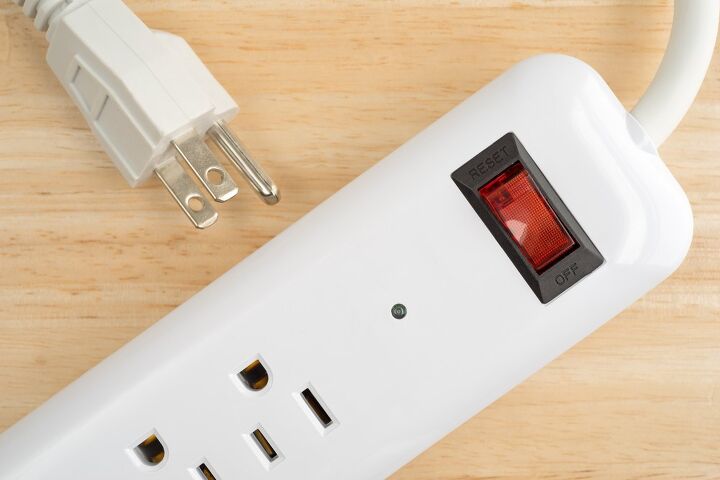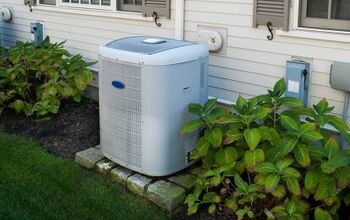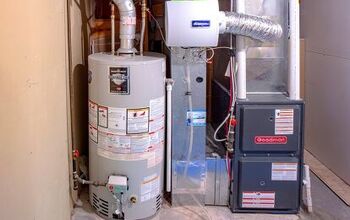Surge Protector Vs. GFCI: Which Outlet is Safer and Better?

The electrical wiring in your home, despite not being able to see it, is one of the most complex installations there is. But even when done properly, there is no guarantee that there will be no surges or spikes in energy.
That is why it is important to have protection in place for your appliances and other items that you plug in. You can avoid the issue through two paths: a surge protector or GFCI. The former is something you plug directly into and it absorbs the impact of that surge. They are often in longer strips that have multiple plugs. A GFCI is a grounding path, shutting off electrical power to appliances to keep you safe.
Do You Need to Hire an Electrician?
Get free, zero-commitment quotes from pro contractors near you.

Electrical Currents
Even with properly installed electrical wiring, electricity presents a danger. There can be surges in voltage from time to time, potentially creating danger for yourself and your appliances. Because electricity is somewhat unpredictable, there is not a whole lot that can be done to stop them from happening.
But there are protective measures that can be implemented to keep both you and your appliances safe. That is where surge protectors and GFCI comes into play. Think of them as stopgaps between that electrical current and you.
What is a Surge Protector?
A surge protector helps you to avoid the damages that can come with sudden power surges. Most of the electronic equipment in your home – television, computer, etc. – are rated to handle a certain level of power.
From time to time, there can and will be electrical surges into your home. The surge protector works to absorb the blow of those surges, keeping your appliances from feeling the blow. They aren’t absolute; a surge large enough could fry both the surge protector and your electronic equipment.
Surges that large are a rarity, though. So for the most part, a surge protector will keep your electronics safe for whatever the rated period is. The more blows the surge protector takes, the quicker it wears down.
How Does a Surge Protector Work?
Though it sounds like something of a complicated endeavor, the process is actually kind of simple. Surge protectors regulate the current and voltage within those electrical appliances and equipment. This is done through either blocking or grounding, bringing that current to a safe level by the time it hits the equipment.
It works to extend the life of that equipment and those appliances. They are not rated to handle repeated spikes and surges, so the protector steps in to take the brunt for them. Surge protectors are rated to handle a lot more abuse, making them great for extending the life of your electronic equipment and appliances.
What is a GFCI?
When there is a break in the low-resistance grounding path that runs from an electrical system or a tool, what is known as a ground fault takes place. When situations like these arise, that electrical current moves through another route to get to the ground. That can result in serious injuries and even death.
Ground-Fault Circuit Interrupters (GFCI) are used to help avoid situations like that. They act fast, something to the effect of a circuit breaker. When a ground fault happens, the GFCI works to shut off electrical powers. That means securing both the appliance and protecting you as well.
How Does a GFCI Work?
Though it sounds like something of a complicated thing, a GFCI is actually a pretty simple thing. It works to compare the total current that is both going into and coming back from circuit conductors as well as the equipment.
A GFCI will monitor the power and if it sees a difference of 5 mA between the amount of current going in and returning, then it will interrupt the current. It is a safety measure that keeps both your appliances and you safe from that ground current.
Are They the Same Thing?
Yes and no. Technically speaking, they are different entities. You can think of it in a pretty simple way. A surge protector is meant to protect from surges that come from events like a lightning strike or a power outage.
A GFCI, meanwhile, prevents against ground faults. These are things like electrical shorts. So, while they serve the same basic purpose, they do so in entirely different ways.
What are the Benefits of GFCI?
Now that we have a better idea of how a GFCI works, you may be wondering how they can be beneficial to you and your home. Here are a few of the most important benefits to be had by implementing a GFCI.
Preventing Electrical Fires
A shock is not the only thing that can happen when there is a surge of power. When there is an electrical current surge near loose or exposed wiring, it can potentially start a fire in the walls of your home.
It should go without saying that you do not want fire within your walls. The GFCI outlet keeps that current from reaching those wires. Having a GFCI is important for both fire safety and prevention regardless of the type of home that you live in. Older homes, where electrical oddities are more likely, would greatly benefit from a GFCI.
Preventing Electrical Shock
The primary purpose of a GFCI is to prevent electrical shocks. The GFCI outlet monitors the flow of electricity through its sensors. If there is a current that tries to pass through at an unexpected course, the GFCI will divert it to the ground.
This is important for a few reasons. The least of which is that, if that ground fault manages to come into contact with someone, it can have extremely dangerous consequences. These outlets shut off the power to that outlet as soon as it senses the inconsistency. That can be a potentially life-saving benefit.
What are the Benefits of a Surge Protector?
We now know the benefits of a GFCI, but what about surge protectors? How does installing or using them in your home benefit you? Here are some of the most important benefits of implementing a surge protector (or protectors) in your home.
Fewer Replacement or Repair Costs
Power surges can do serious damage to equipment and devices that are plugged into your outlets. They are not rated to face repeated surges in electrical current. All it takes is the right one to render your devices or equipment completely useless.
When you use a surge protector, you reduce the risk of that happening. By minimizing the electrical current differences that your equipment faces, you can prolong their life. That means less of a possibility of dealing with having to repair or replace them, too.
Lower Maintenance Costs
Depending on the system in your house, some are at greater risk than others to those electrical surges. If you go without surge protectors to keep them safe, you run the risk of facing increased maintenance costs along the way.
By using a surge protector, you can keep the number of required service calls to a minimum. The surge protector takes the brunt of the force, instead, extending the life of those devices. All of it means money saved along the way.
Surge Protectors are Affordable
Perhaps the best thing about surge protectors are that they are affordable. Having a whole-home surge protector will cost you just a few hundred bucks and it can be installed the same day. That means you get the benefits right away.
You can also buy power strips and other electrical plugins that have surge protection built-in. If you want to add an extra layer of protection to your television, computer, and other electronic devices, this is a smart route to go.
Do You Need to Hire an Electrician?
Get free, zero-commitment quotes from pro contractors near you.

Why You Should Be Using Surge Protectors/GFCI Outlets
We have already covered a great deal about both of these items. But if you need further reassurance, there are more than a few reasons why you should be using one or both of these.
Avoid Issues with Your Power System
There is no telling what may cause those higher levels of electricity. But we do know that those surges can be devastating, especially to your power system. For older homes where wiring may be a bit questionable, a surge protector or GFCI can help control that flow of power. All of which means that your circuits function the way that they were meant to.
Avoid Damages to Appliances and Electrical Equipment
This is the most common reason that people have for implementing GFCI outlets or surge protectors. The electronic devices and appliances in our home are not meant to take on those power surges. Even one blow could be enough to render them useless.
Having a GFCI or surge protector around means protecting that equipment. It also means keeping you safe from a sudden jolt if you go to unplug one of these devices as a surge is happening.
Keeps You Safe
Perhaps the most important reason for using a GFCI or surge protector is your safety. Electrical currents are unpredictable and dangerous. When a surge happens, there needs to be something between you and that surge. Think of it as protection not only for your devices, but for you as well.
Related Articles

Ryan Womeldorf has more than a decade of experience writing. He loves to blog about construction, plumbing, and other home topics. Ryan also loves hockey and a lifelong Buffalo sports fan.
More by Ryan Womeldorf










![10 Best Scroll Saws for 2022 [Ultimate Reviews & Buyer's Guide]](https://cdn-fastly.upgradedhome.com/media/2023/07/31/9070684/10-best-scroll-saws-for-2022-ultimate-reviews-buyer-s-guide.jpg?size=350x220)
















